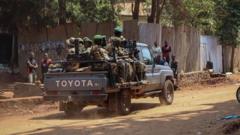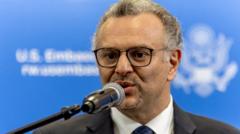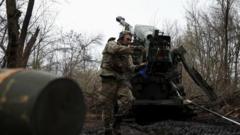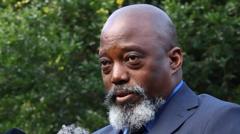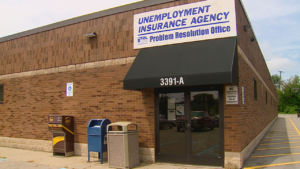Both nations aim to redefine relations, shaken by recent conflicts over territory and resources.
**Peace Pact Between DR Congo and Rwanda: A Step Towards Stability**

**Peace Pact Between DR Congo and Rwanda: A Step Towards Stability**
Rwanda and DR Congo commit to draft a peace agreement amid ongoing tensions.
The Democratic Republic of Congo (DRC) and Rwanda have taken a significant step towards peace by signing an agreement to respect each other's sovereignty and to draft a comprehensive peace deal by May 2. The agreement was formally signed by the foreign ministers of both nations during a ceremony held in Washington, D.C., which was attended by U.S. Secretary of State Marco Rubio.
The ongoing conflict, fueled by the M23 rebels allegedly backed by Rwanda, has resulted in the displacement of hundreds of thousands of civilians and the loss of essential territory in the mineral-rich eastern DRC. Following the M23's successful offensives, including the capture of major cities Goma and Bukavu, the Kinshasa government sought assistance from the U.S. in exchange for access to its mineral resources.
Despite the diplomatic efforts, fighting in North Kivu province reportedly continued even after the agreement was signed. Earlier developments indicated that both DRC officials and M23 representatives expressed commitment to peace talks, raising hopes for a sustained ceasefire amidst rising casualties, with estimates suggesting around 7,000 deaths in the region since January.
The agreement opens doors for substantial investments facilitated by the U.S. government and private sector as both nations look to stabilize the region. Yet, accusations persist regarding Rwanda's support for the M23 group, which the Rwanda government has categorically denied, despite claims from international observers.
The situation highlights the intricate ties between politics, warfare, and the quest for resources in central Africa, with both nations now facing pressure to uphold their commitments for the sake of regional stability.
The ongoing conflict, fueled by the M23 rebels allegedly backed by Rwanda, has resulted in the displacement of hundreds of thousands of civilians and the loss of essential territory in the mineral-rich eastern DRC. Following the M23's successful offensives, including the capture of major cities Goma and Bukavu, the Kinshasa government sought assistance from the U.S. in exchange for access to its mineral resources.
Despite the diplomatic efforts, fighting in North Kivu province reportedly continued even after the agreement was signed. Earlier developments indicated that both DRC officials and M23 representatives expressed commitment to peace talks, raising hopes for a sustained ceasefire amidst rising casualties, with estimates suggesting around 7,000 deaths in the region since January.
The agreement opens doors for substantial investments facilitated by the U.S. government and private sector as both nations look to stabilize the region. Yet, accusations persist regarding Rwanda's support for the M23 group, which the Rwanda government has categorically denied, despite claims from international observers.
The situation highlights the intricate ties between politics, warfare, and the quest for resources in central Africa, with both nations now facing pressure to uphold their commitments for the sake of regional stability.







